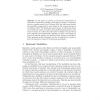Free Online Productivity Tools
i2Speak
i2Symbol
i2OCR
iTex2Img
iWeb2Print
iWeb2Shot
i2Type
iPdf2Split
iPdf2Merge
i2Bopomofo
i2Arabic
i2Style
i2Image
i2PDF
iLatex2Rtf
Sci2ools
158
click to vote
AMSTERDAM
2009
2009
There Is Something about Might
In this paper we present an alternative interpretation of statements of epistemic possibility, which does not induce a consistency test on a common ground, as in (Veltman 1996), but which tests whether the possibility is supported by some update of the common ground, as in (Veltman 1984). The information space relative to which such claims are evaluated are taken to consist in the possible developements of a discourse in action. It is shown that this notion of Might not only behaves better logically and pragmatically speaking, but that it also allows for non-trivial attitude reports and questions about epistemic possibilities. These epistemic modal statements can also be understood to guide or focus the inquisitive actions of the discourse participants. 1 Epistemic Modalities Epistemic modal operators like Might and Must in English, and semantically related verbs, adverbs and markers, express a kind of possibility or necessity relative to some body of knowledge, evidence, or other cons...
Related Content
| Added | 16 Feb 2011 |
| Updated | 16 Feb 2011 |
| Type | Journal |
| Year | 2009 |
| Where | AMSTERDAM |
| Authors | Paul Dekker |
Comments (0)

